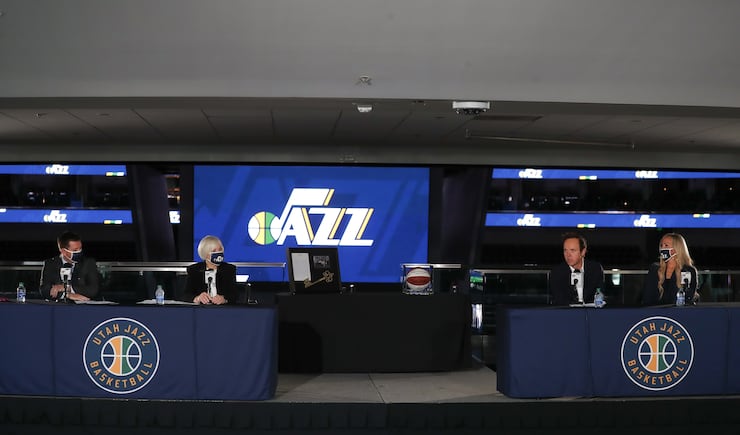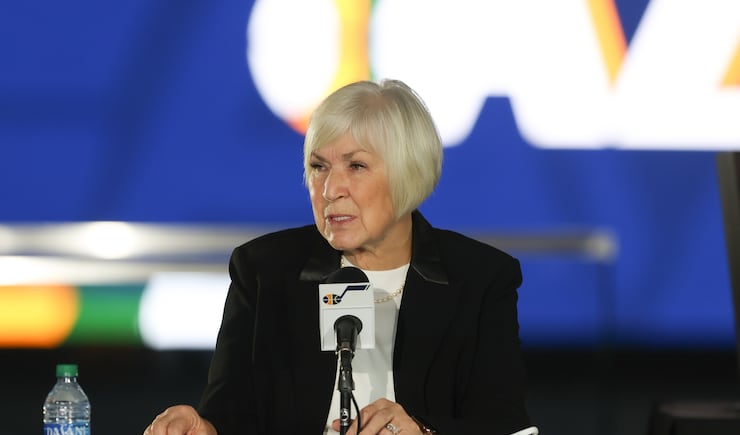When the stunning announcement came that the Utah Jazz had been sold, there was one question that almost everyone asked: What would Larry have done?
The late Larry H. Miller, the man who risked his entire fortune and more to keep the Jazz in Salt Lake City, famously vowed that they would never leave and that selling the team would be tantamount “to selling Canyonlands.”
Gail Miller, who became owner and chairman of the board of the Jazz’s parent company after her husband passed away in 2009, asked herself the same question — what would Larry do? So did the family management group, which ultimately makes the decisions for the family trust (the Jazz were placed in the family trust when it was created in 2017 to keep the franchise in Utah).
“Obviously, when we started talking about the idea (of selling the team), what-would-Larry-do came up,” Gail Miller said in an exclusive interview with the Deseret News Wednesday afternoon. “I think my most overriding feeling is that I don’t think Larry cares. When he was dying it was really evident that this world no longer mattered to him. His attention was diverted to more important things.
“He put me in charge. He told me, ‘You’re going to be the trustee. You’ve got the institutional knowledge. You do what you think is best.’ He had faith in my judgment and ability to make decisions and take care of things.” — Gail Miller
“He put me in charge. He told me, ‘You’re going to be the trustee. You’ve got the institutional knowledge. You do what you think is best.’ He had faith in my judgment and ability to make decisions and take care of things.”
After a thorough and open discussion with the family management group — which consists of her five children and grandson — she says they agreed the time was right to sell the team.
“We all had to come to the conclusion on our own,” said Miller. “Some were slower to come to the party. In the end we all saw the wisdom in this decision, which opens an asset we can do so much more with.”
Long before Jazz sponsor and Utah native Ryan Smith agreed to buy the team for a reported $1.66 billion, the Millers had been discussing ways to diversify their business. Their board of directors had been encouraging diversification and strategic planning for the future. The sale of the Jazz will provide the means to do just that, as well as pursue other philanthropic efforts by the family foundation.
“We can diversify our business, enrich lives, continue to be what we are in a different venue,” Miller said. “We don’t know what that is. We’re going to take time, survey the land, see what’s out there, see what we’d like to do, what would be exciting for us. We’ve got this next generation (of family) coming up that’s really interested in being involved in the business. This will give them opportunities for new ways to be engaged.”





The Millers had previously rebuffed offers to buy the Jazz, one of them coming soon after Larry Miller died. “We were not looking to sell the Jazz,” said Miller, who says Smith himself had made several inquiries about buying an interest in the franchise. “We always said no.”
His interest in buying all or some portion of an NBA team was no secret and for that reason he received inquiries about teams on the market. Smith traveled to one NBA city to explore the possibility of buying a minority piece of a franchise but decided he wasn’t getting enough for the money. In January he was in serious negotiations for the purchase of another team, when he met Miller at the Silicon Slopes Tech Summit, where Gail was one of the keynote speakers.
After asking to speak to her as she came off the stage, he sought her advice about buying and owning a team. After about an hour he again inquired about the future of the Jazz and the possibility of buying into that franchise. Miller says she told him the Jazz were not for sale but good luck with his new team.
Smith, who built his fortune with the Qualtrics tech company, ultimately decided not to buy other teams for the simple reason that they were not in Utah, where he lived and grew up. Things got more serious at the end of August when the Real Salt Lake soccer team went up for sale. Smith tweeted his interest in buying that franchise and discussed it with Steve Starks, CEO of the Miller Group of Companies. At some point Smith again expressed his interest in buying the Jazz and this time made a more specific offer. Starks asked, “Is this a conversation or is this an offer?” Smith said it was an offer and Starks took it to Gail Miller and her son Steve.
It was not only an offer, it was what Gail called “a bonafide offer.”
“We discussed it,” she said. “We looked at the pros and cons. It got us thinking — we are doing all this strategic planning and talking about diversifying. This is interesting timing. Then we convened the family management group. We had a lot of long, hard discussions and soul searching. What will this do to our employees? How will the public feel? Will the public think we’re bailing out? How would Dad (Larry) feel? But in the end … all six of us determined it was right.”
Miller continues. “We were not looking to sell the Jazz. The offer came to us. We decided because Ryan opened the door with a bonafide offer and one that would keep the Jazz here. It was like everything fell in place. There were just too many things coming together that pointed to an opportunity ahead of us. As Ryan came on the scene he was feeling the same way. He felt it was something he was guided to do. With his liquidation of Qualtrics this was an opportunity he could take on.”
Smith, 42, and his wife Ashley are about the same age as Larry and Gail were when they bought the team. Sources say Smith considers the Jazz ownership “a stewardship,” a term the Millers have used frequently. Smith, who grew up in Provo and attended Utah Valley University and BYU, told one acquaintance, “This move is the greatest insurance you could get to keep the team here. I’m a Utahn. I grew up here. If I wanted to buy outside of Utah, I would have. I’m not moving.”
Says Miller, “Ryan has promised (the team will remain in Utah). We believe in it. We are convinced that’s his goal.”
“People say Larry would turn over in his grave if he knew I sold the team. How do they know what Larry would do? When Larry was on his deathbed, he told me, ‘Stay in long enough to be a bridge till the family is ready to decide what they want to do.’ The real message is that I am the owner of the company and everything I’ve done is with Larry’s blessing.” — Gail Miller
She says one comment she hears is that people believe she had violated the family trust that was designed to keep the team here. “All I can say is that the purpose of the trust is being fulfilled. I kept it in the trust to keep it in Utah, which prevented it from being sold without permission of the whole management group. We would not have sold it if it had not been promised that it would stay in Utah, so we are fulfilling the purpose of the trust.”
Miller said the selling of the Jazz is certainly bittersweet, especially when it comes to the relationships she built with employees, most of whom she believes share the loyalty and love the Millers feel about the Jazz and the company. “They’re all family to me, from the janitors to management,” she said. “I care about them. I hope they enjoy working with Ryan and that he understands the relationships there. One of the reasons we sold to Ryan is he shares our values. He and his wife visited me a couple of weeks ago to try to understand things so they could do what we did. I told them, don’t ever forget your values. It comes through in everything you do. Larry used to say, don’t believe your press clippings; you’re only as important as you are to your family and those who love you.”
Gail, who is retaining a minority interest in the team, always attended the games with Larry even though she didn’t always want to be there. She wasn’t even able to visit with him or any of the guests who were invited to sit with them because Larry said it looked like she wasn’t paying attention to the team. She wanted to skip some of the games, but Larry feared it would appear there was something wrong with their marriage. And yet after Larry was gone, she soldiered on and continued to show up at the games anyway, carrying out the duties he had filled. She says she will continue to attend games.
“(Smith) told me I can take a vacation now and then,” she says, smiling. “It’s hard to break that habit.”
Miller wraps things up by saying, “People say Larry would turn over in his grave if he knew I sold the team. How do they know what Larry would do? When Larry was on his deathbed, he told me, ‘Stay in long enough to be a bridge till the family is ready to decide what they want to do.’ The real message is that I am the owner of the company and everything I’ve done is with Larry’s blessing.
“I feel very much at peace. I’d like to think I’ve honored Larry in all I’ve done.”







